Sleeping can at times seem like the most straightforward thing in the world. But if you’ve ever grappled with insomnia, getting a good night’s sleep is unlikely to be something you take for granted. Essential to survival, this natural phenomenon is universally important for humankind (via MEDtube Science).
Many ancient civilizations drew upon the healing powers of slumber (via Sleep Medicine). In ancient Egypt, physicians prescribed a night at a “sleep temple” to treat various ailments, while the induction of sleep, also known as “dream incubation,” became an established healing practice (via Ancient Origins). For centuries, sleep was deemed a passive process: The body and brain were believed to “switch off,” akin to being in a coma or under anesthesia, almost to the point of nearing death (via Smithsonian Magazine). But modern science has shown us that it isn’t quite this simple. The brain and body don’t shut down entirely, but rather slow down to undergo a series of intricate processes that are vital to recovery (via MEDtube Science).
“Sleep services all aspects of our body in one way or another: molecular, energy balance, as well as intellectual function, alertness, and mood,” Merrill Mitler, a neuroscientist and sleep expert, told NIH News in Health. Read on to find out what happens to your body when you get a full night’s sleep.
Your brain recharges and reorganizes itself
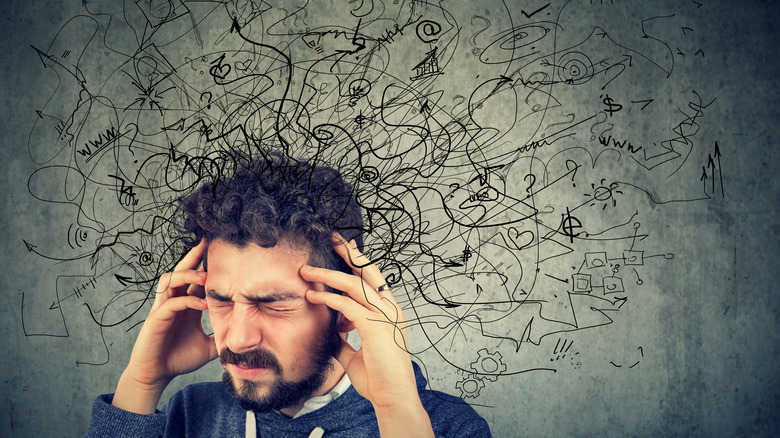
A full night of sleep is considered to be around eight hours (via NIH News in Health). Most adults need between seven to eight hours for normal cognitive and behavioral functioning, estimate scientists — though, this varies depending on the individual. During this time, our bodies relax and we become less sensitive to external stimuli. Yet, “the brain is engaged in a number of activities necessary to life — which are closely linked to quality of life,” Mark Wu, neurologist and sleep expert, told Johns Hopkins Medicine.
Sleep allows your brain to refuel and reorganize itself, regenerating neurons within the cerebral cortex, so that you can think more clearly and have sharper reflexes the next day (via MEDtube Science). A recent study from the journal Neurological Sciences found that just one night of sleep deprivation can alter brain connectivity and undermine executive function, which is the brain’s ability to plan, problem-solve, make decisions, and switch attention between things.
“Loss of sleep impairs your higher levels of reasoning,” neuroscientist and sleep expert Merrill Mitler told NIH News in Health. Interestingly, people are twice as likely to have a road accident on six to seven hours of sleep compared to eight, and your chances of a car crash quadruple on less than five hours, according to a study from the AAA Foundation for Traffic Safety. Operating on little to no sleep has been likened to “driving while intoxicated with alcohol” by some scientists (via MEDtube Science).
Your memory is strengthened and solidified
“Sleep is the intermediate state between wakefulness and death,” wrote Scottish physician Robert Macnish in the opening of his 1834 book The Philosophy of Sleep (via Neurologic Clinics). But the discovery of the different sleep phases in the mid-20th century led to a shift in scientific attitude. We now know that the brain cycles through two main stages during a full night of sleep: Non-rapid eye movement (NREM) and rapid eye movement (REM), per MEDtube Science. Memory formation was once thought to occur during REM sleep — which is when we dream and when brain activity rises to similar levels as when we’re awake — but newer research indicates that other stages of sleep are also important (via Frontiers in Human Neuroscience).
Researchers suggest that declarative memories — namely personal experiences, general knowledge, and learned information — are consolidated during slow-wave sleep (also known as “deep sleep”), which is the third and final stage of NREM sleep (via Frontiers in Psychology). This is when your brain restores itself and strengthens connections through neuronal synapses. REM sleep, on the other hand, is said to promote the consolidation of emotional memories and procedural memory, which involves remembering how to perform day-to-day tasks like playing an instrument or riding a bike (via Journal of Neuroscience). Sleep deprivation can have a pretty brutal effect on both short-term and long-term memory, but the specific mechanisms behind this remain unclear.
Toxic waste byproducts are removed
Rido/Shutterstock
Around the start of the 20th century, the “hypnotoxin theory” stated that the brain was poisoned into a state of sleep by the gradual build-up of toxins throughout the day (via Neurologic Clinics). Decontamination of the brain then occurred during sleep, bringing the mind and body back to wakefulness. This theory was challenged by Nathaniel Kleitman, one of the discoverers of REM, in the wake of modern sleep science (via Smithsonian Magazine). But the idea that sleeping acts as a sort of “garbage disposal in the body,” sweeping out the accumulation of toxic cellular byproducts, is an area of continued research today (via MEDtube Science).
Researchers have described this waste disposal pathway as the “glymphatic system” (via Current Opinion in Physiology). It’s hypothesized that cerebrospinal fluid circulates the brain, and keeps its neurons clean and functioning by facilitating the transport and clearance of metabolic waste products — a bit like a plumbing system. While some of these toxins are benign, others can lead to the development of various illnesses including neurodegenerative diseases. The glymphatic system carries out most of its work during deep sleep, notes a 2024 study from Brain Sciences, which may explain the relationship between chronically impaired sleep and poor health consequences, including the development of conditions such as Alzheimer’s disease.
Your immune system is supported
Chinnapong/Shutterstock
Anyone who’s suffered the perils of insomnia knows how debilitating it can be. Besides the psychic torture, the hustle to nod off can compromise your immune health, which explains why people often fall sick if they’ve been regularly missing out on a full night’s sleep. A 2024 study from the International Journal of Behavioral Medicine showed that people who were well-rested on the two nights prior to having a flu vaccination developed a more robust antibody response to the shots and sturdier protection against the virus.
Getting a full night’s sleep enables your body to release a sufficient supply of cytokines, according to a review article in BioMed Research International. These are a type of protein that strengthens immunity by informing infection-fighting white blood cells of any harmful pathogens floating around your system. A shortage of sleep can mean that your body doesn’t produce enough cytokines and its defenses against germs and viruses are weakened. This can lead to a build-up of inflammation, which underlies various illnesses including autoimmune and neurodegenerative diseases like dementia. “It might not be an overstatement to say that — if left unattended and overlooked, sleep deprivation will impose severe healthcare and medical economic burden in the society,” conclude the authors.
Your muscles are temporarily paralyzed
Andrey_Popov/Shutterstock
The ancient Egyptians regarded sleep as a passage to another realm (via Sleep Medicine). They believed that the soul temporarily traveled out of the body to communicate with spirits, which also accounted for the immobility and unresponsiveness that was observed in people as they slept.
Researchers now understand that although we’re in an unconscious state while sleeping, we can still be aroused and woken up by stimuli around us (via MEDtube Science). During an eight-hour sleep, we spend most of our time in NREM sleep, as the body relaxes and recuperates. The brain slips in and out of REM sleep about four or five times throughout the night, which is when dreams generally occur and the eyes move quickly. The body also suppresses voluntary muscle function, so that you don’t physically act out your dreams, reports The Ohio State University Wexner Medical Center. Sleep paralysis occurs when people “wake up” before their REM cycle has finished, so they’re still unable to move or speak, which can be alarming.
Based on the findings of a study from The Journal of Neuroscience, the neurotransmitters gamma-aminobutyric acid (GABA) and glycine work together to “switch off” your muscles during REM sleep, causing skeletal muscle paralysis (also known as atonia). When the receptors for these chemicals are simultaneously blocked, muscle twitches and body movement increase. This might help make sense of the mechanisms behind REM sleep behavior disorder, in which people enact their dreams, putting them at risk of injury.
Various hormones are released

During sleep, the body churns out various hormones, each of which has its own unique purpose (via International Journal of Endocrinology). Melatonin is produced by the pineal gland as darkness approaches, promoting feelings of sleepiness and helping you remain asleep throughout the night. While you’re sleeping, your brain’s pituitary gland releases growth hormone into your bloodstream, which helps your body grow and repair itself, while supporting bone and muscle development, as noted by the Society of Endocrinology.
Throughout the night, your body maintains sufficient levels of ghrelin and leptin, which are hormones that help control your appetite, per International Journal of Endocrinology. The stress hormone cortisol dips around bedtime, but starts to climb back up again in the middle of the night, peaking in the morning to help perk you up and kick start your day (via Learning Memory). Other hormones that play a role in sleep regulation include the neurotransmitters serotonin (5-HT), norepinephrine, and acetylcholine, which help your brain move seamlessly from one phase of sleep to another.
There’s evidence that women’s sleep-wake patterns are also governed by different hormones that are released across the menstrual cycle (via Medical Sciences). Specifically, the fluctuation of progesterone and cortisol levels are now recognized as causing greater sleep disturbances and potentially altering REM sleep, which, in turn, may affect how women experience dreams.
Your metabolism slows down

New Africa/Shutterstock
Sleep is often implicated as a crucial element of maintaining healthy weight loss, while insufficient sleep has been identified as a risk factor for obesity (via Sleep Medicine). When you sleep, the body secretes and makes use of the neurotransmitters ghrelin and leptin to help you navigate your appetite (via International Journal of Endocrinology). Ghrelin triggers sensations of hunger, and leptin enables you to feel satiated and full. These hormones are naturally produced throughout the day and night, but when you skip out on a full night’s sleep, they can be thrown out of whack, shows research (via Annals of Internal Medicine). For example, one study discovered that without sleep, your body produces more ghrelin and less leptin, which can send your normal signals of hunger and fullness awry (via Best Practice & Research Clinical Endocrinology & Metabolism). This certainly brings some light as to why some people experience a greater urge to eat when they get less sleep than usual.
What’s more, your metabolism — the process that converts the food and drinks you consume into energy — slows down while you’re sleeping, explain researchers (via International Journal of Endocrinology). Throughout the night, your metabolic rate decreases by 15% and reaches its lowest point in the early morning. A 2024 study exploring the connection between sleep and metabolism found that people who slept less than six hours each night had a greater risk of both metabolic syndrome and obesity (via Sleep).
Your body regains its balance

Yuttana Jaowattana/Shutterstock
Some of the greatest thinkers throughout history, from Hippocrates to Aristotle to Freud, have attempted to make sense of sleep and its physiological and psychological basis (via Handbook of Clinical Neurology). This basic need allows the brain and body to restore various vital functions and abilities, including your sense of balance.
Balance is the result of different systems working together to create stability in your body and vision (via National Institute on Deafness and Other Communication Disorders). It relies on a combined input of signals to and from your brain and various other organs and structures in your body. Without harmony between these parts, you wouldn’t be able to stand or walk without falling flat on your face.
Getting an adequate night’s sleep allows the different components of your body and brain to rest and rejuvenate for the coming day, in turn strengthening the communication between them (via MEDtube Science). A 2024 study showed that not getting enough sleep can impair your postural stability. This can lead to an increase in falls and injuries, and can significantly derail your physical performance in sports and exercise. “The fact is, when we look at well-rested people, they’re operating at a different level than people trying to get by on 1 or 2 hours less nightly sleep,” neuroscientist Merrill Mitler told NIH News in Health.
Your blood sugar levels fluctuate
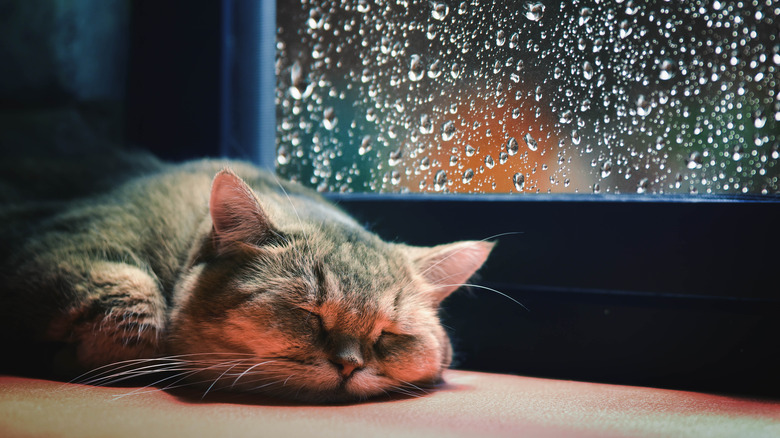
Tongsai/Shutterstock
Blood sugar levels increase throughout the night, usually spiking at around 4 a.m. (via WebMD). This is commonly alluded to as the “dawn effect.” During sleep, most people’s bodies will produce insulin — a hormone that converts glucose from the blood into energy — in order to stabilize and regulate blood glucose levels. This process is governed by your circadian rhythm cycle (via Sleep Medicine Clinics). But when your sleep is disrupted and you don’t get enough hours under your belt, it can disorient your body’s natural insulin response and other connected processes, causing insulin resistance and impairment in glucose metabolism. This means that your body has trouble producing insulin and transferring glucose to your organs and cells, which may cause high blood sugar levels and even increase your chances of developing type 2 diabetes.
Studies have shown that over the past 30 years, people in the U.S. have been sleeping less and less, per Sleep Medicine Clinics. The plummeting hours of sleep are reflected in the overall rise in diabetes and obesity, suggest some researchers. Like most innate behaviors, we each have our own unique and complex relationship with sleep. But chronic sleeplessness has a universally negative impact on health and eventually sets off a domino effect.
Your blood pressure lowers
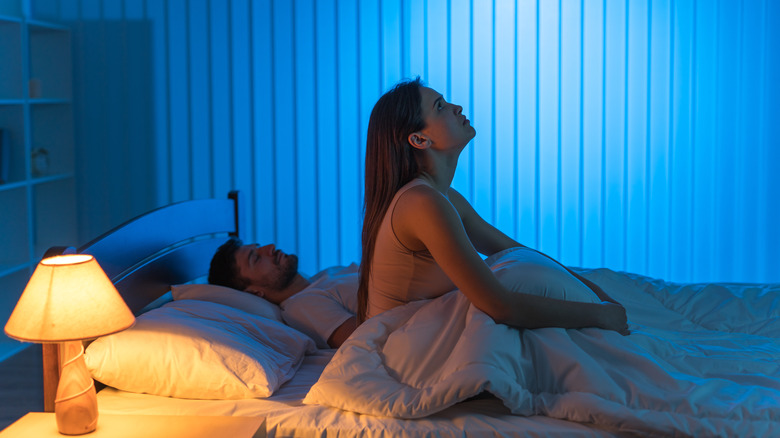
Realstock/Shutterstock
Another big change that occurs in your body when you sleep is that your blood pressure drops by 10-20% (via WebMD). During this time, the sympathetic nervous system, known as the flight or fight system, is able to slow down and take a break, like numerous other functions in your body. Those who exhibit more than a 20% drop in blood pressure, however — also referred to as “extreme dippers” — have double the risk of experiencing a stroke.
Research has shown that people who are sleep-deprived (sleeping less than five hours a night) experience increases in sympathetic arousal, which revs up their heart rate and blood pressure and increases their risk of hypertension (via Hypertension). Researchers at the Nurses Health Study also found that sleep is a key factor influencing women’s heart health, and that women who get too much of too little sleep — fewer than five hours of sleep per night (so-called “short sleepers) or more than nine hours — have a greater risk of cardiovascular problems (via The Conversation). A 2024 study published in Frontiers in Psychology reiterated these findings, demonstrating that lack of sleep (i.e. less than three hours over three days) generally worsens blood pressure and heart function, and elevates people’s risk of heart disease in the long term, particularly for those who already suffer from heart problems.
The skin produces more collagen
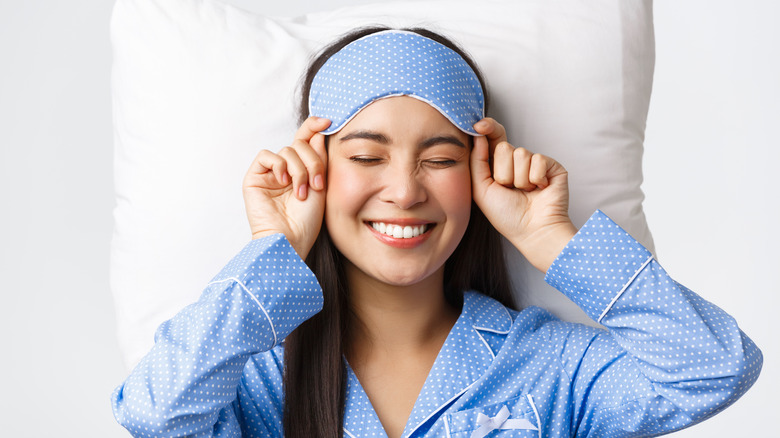
Mix and Match Studio/Shutterstock
The notion of “beauty sleep” is frequently tossed around in conversations. But it seems that the concept isn’t just an old wives’ tale — there’s actual science to back it up. Specifically, a 2024 study from the journal Nature Cell Biology revealed that skin repairs and makes new collagen while you’re sleeping, which reduces the appearance of sagging and wrinkles and makes your skin look plumper. On the other hand, getting only 5 hours of sleep per night can leave your skin feeling dehydrated and looking more wrinkled, reported Patricia Wexler, a dermatologist in New York, via WebMD.
Researchers have also uncovered that when you sleep, your body repairs and rebuilds compromised skin cells throughout the night (via The Journal of Clinical and Aesthetic Dermatology). A long-term lack of sleep can interfere with these processes, and the effects of this might start to manifest physically on your face in a wide spectrum of ways beyond wrinkles, including redder eyes, drooping eyelids, darker circles under the eyes, a duller complexion, and untimely aging (via Sleep). It turns out that sleep may be the ultimate elixir for youth — and another solid justification for an early night and consistent bedtime routine.
Your muscles recover

tommaso79/Shutterstock
Researchers are finding that sleep also plays an important role in muscle recovery and growth (via The Journal of Pediatrics). Over time, your muscles develop small tears from being strained and overworked, especially if you engage in intense workouts or heavy weight lifting. When growth hormone is secreted during slow-wave sleep, namely the third stage of NREM sleep, it triggers tissue regeneration and muscle repair. In fact, your muscles undergo tissue and cell restoration predominantly while you sleep, according to a study from the 2024 edition of the journal Life Sciences. So, when people consistently fail to get a full night’s sleep, their bodies experience a deficiency in growth hormones, and their muscles miss out on this important process of healing. As a result, they may feel tense or sore the next day, while recurring sleeplessness can often bring on chronic pain in the long run (via The Journal of Pain).
Sleep repairs brain cell damage
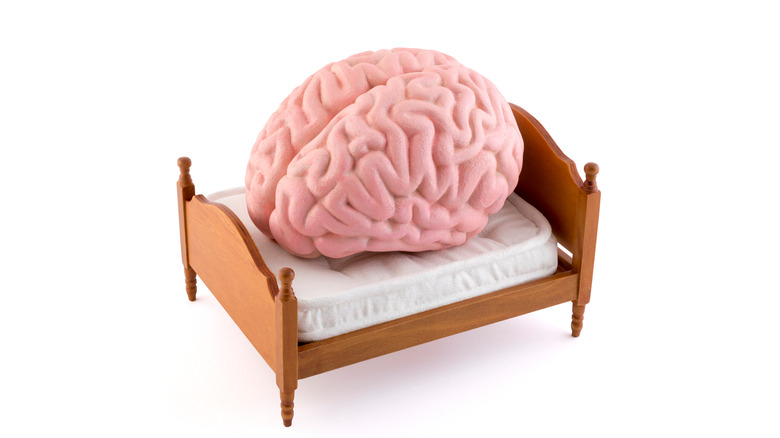
Jakub Krechowicz/Shutterstock
On average, human beings spend one-third of their lives sleeping (via BioMed Research International). What’s fascinating is that during this time the body and brain are both deep in rest and hard at work, explain researchers, as this is a crucial time for the brain to replenish its diminished energy stores while creating new neurons (known as neurogenesis). Prolonged sleep deprivation can blunt the growth of new brain cells and give rise to cognitive dysfunction as well as contribute to the development of mood disorders (via Sleep Medicine Reviews).
Scientists speculate that sleep supports the brain by reducing cell damage caused by oxidative stress (via PLOS Biology). Oxidative stress occurs naturally when there’s an imbalance between free radicals and antioxidant activity, which can result in cell and tissue damage. Besides playing a part in the aging process, the effects of oxidative stress are known to contribute to neurodegenerative disorders such as Alzheimer’s disease, Huntington’s disease, and Parkinson’s disease, and its role in neuropsychiatric disorders like depression and anxiety disorders has also been identified (via Journal of Pharmacology and Experimental Therapeutics).
When you sleep, the body generates neutralizing enzymes, including superoxide dismutase (SOD), which repairs and minimizes damaged cells, details a 2024 study (via Sleep). But when the brain is sleep deprived, SOD levels decline, resulting in greater DNA damage and cell injury, “thereby providing linkage between sleep loss and disease risk,” point out the study authors.
Certain neurotransmitters are released or blocked
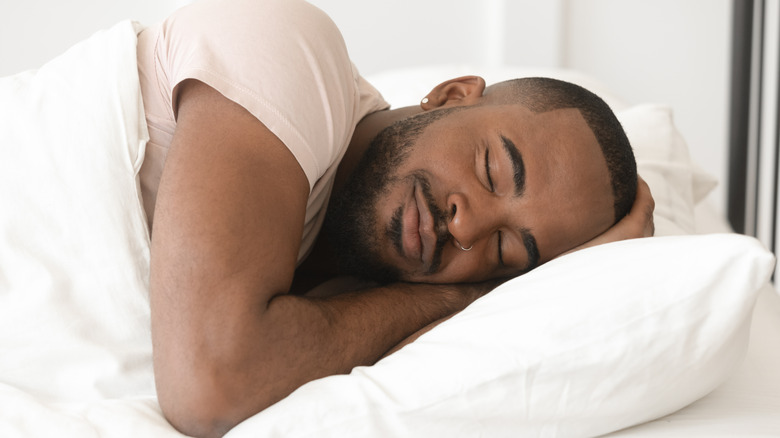
fizkes/Shutterstock
Sleeping consists of a dynamic interplay of different brain regions and a cocktail of neurotransmitters that orchestrate sleep and wakefulness (via Sleep Medicine Clinics). While sleeping, your hypothalamus releases the sleep neurotransmitter GABA, which inhibits the wake-promoting areas of your brain and quiets it down. This is one of the chemicals responsible for lulling you into dreamland, and it may also account for the pain-relieving and anti-anxiety effects of sleep, as highlighted by a 2024 study from the journal Frontiers in Neuroscience.
During the NREM stage of sleep, the body turns off certain neurotransmitters, including norepinephrine, serotonin, and histamine, which allows their receptors to regenerate and regain sensitivity (via MEDtube Science). Each of these chemicals has its own important role and function, and your brain and body would eventually suffer in their decline or absence, per Sleep Medicine Clinics. For instance, norepinephrine and histamine promote feelings of wakefulness and arousal. And you can thank serotonin for your calm and happy mood, since this neurotransmitter is often described as the brain’s “feel-good” molecule — which might be one explanation for why skimping out on a full night’s sleep can leaving you feeling pretty cranky.
The dysregulation of neurotransmitters can show up in various ways. It goes without saying that getting sufficient sleep is one of the most important lifestyle factors for ensuring that your brain has an ample supply of these invaluable chemicals.
Anti-Diuretic Hormone (ADH) stops you from peeing
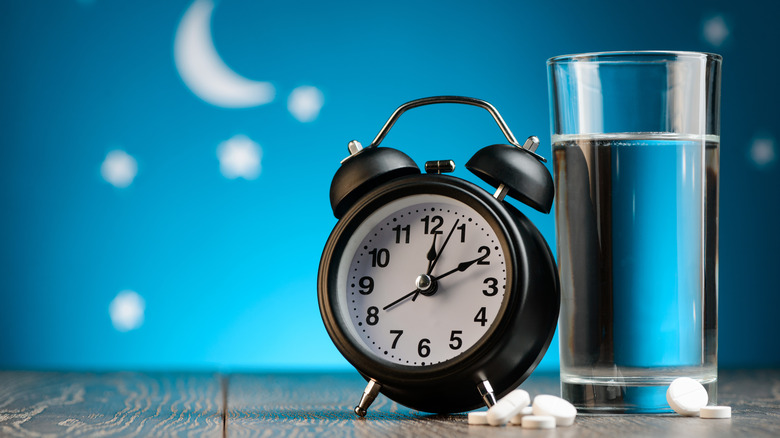
Yuriy Golub/Shutterstock
Have you ever been curious as to why you’re generally able to sleep throughout the night without being disturbed by the constant nudge to pee? As it turns out, antidiuretic hormone (ADH) is pumped out by your hypothalamus and helps your kidneys regulate the amount of water that’s stored in your body (via You and Your Hormones). The production of ADH typically increases while you’re sleeping, which helps reduce urine output and stops you from constantly waking up overnight to go to the loo (via International Neurourology Journal). But with aging, the nightly secretion of this hormone starts to lessen, point out researchers, which accounts for increased “nocturia” in old age — a condition in which people get up frequently throughout the night with the need to urinate (via Current Aging Science).
So, while it may seem like your brain and body have switched off during slumber, it appears that there are various restorative and protective mechanisms at play, including the release of special hormones that help you sleep peacefully throughout the night. The field of sleep research is continuing to evolve to help shed greater light on exactly what’s happening to you physiologically while you’re sleeping.


